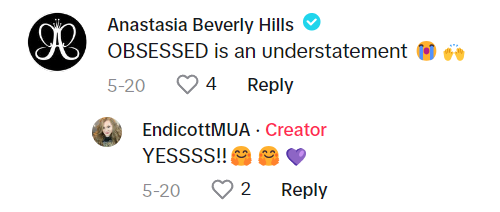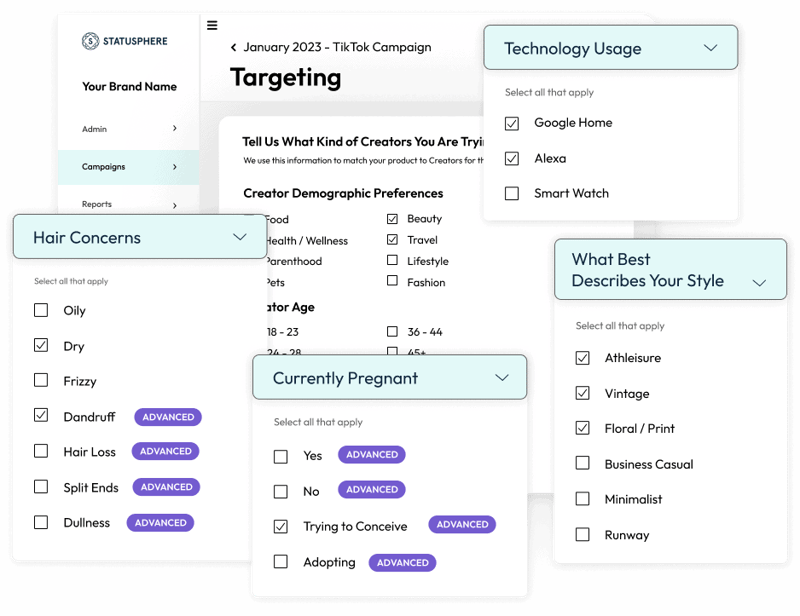
Influencer relations focuses on brands creating positive experiences with influencers. These day-to-day interactions with creators are a subset of influencer relationship management.
Below we dig into influencer relations, plus its benefits, challenges and best practices to get it right.
What is Influencer Relations?
Influencer relations represent the process of building positive experiences with influencers. By forming meaningful relationships with creators, brands build long-lasting partnerships.
Overseeing influencer relations is the duty of an influencer manager. No surprise, right?
While there's no one-size-fits-all approach to the process, tasks and responsibilities related to influencer relations management include:
- Communication, such as conducting outreach and providing feedback to creators.
- Negotiation, including influencer contracts and compensation.
- Retention, which can be accomplished through incentives and rewards.
Examples of Positive Influencer Relations from Brands
They say that actions speak louder than words, right?
Well for the sake of influencer relationship management, both matter!
Consider how you conduct yourself and interact with influencers speak volumes about your brand.
Engaging with content creators consistently and responding promptly signals that you're thoughtful, professional and a pleasure to work with. Doing so is in your brand’s best interest since word of negative creator experiences tends to travel fast.
Like, really fast.
On the flip side, brands that nail their influencer relations management are beloved by creators.
These brands also pay close attention to how individual influencers prefer to be contacted. Not to mention consistently engaging with their influencer community's content to show appreciation.

Source
Beyond positive interactions and praise, consider how some brands go the extra mile to surprise and delight their influencer partners. For example, some brands might send a surprise product kit with personalized packaging for a creator's birthday (or just because).

Source
These examples both highlight how brands can build better relationships through creators. Sometimes that means maintaining a positive attitude when communicating with influencers and other times it means going above and beyond for them.
4 Ways to Improve Influencer Relations
Good question! There's no one-size-fits-all playbook for influencer management.
How you approach influencer relations depends on your brand, industry and target audience.
However, there are plenty of opportunities to improve influencer relations that are fair game regardless of your business or industry.
Let's dive into them below!
1. Personalize the Creator Experience
Competition is fierce when it comes to influencer programs. Making creators feel seen and heard is step one to improving influencer relations and building those long-term partnerships.
But let's be transparent: personalizing interactions can be a time-sink.
That's why it's important to take advantage of opportunities to combine personalization with influencer marketing automation. For example:
- Empower creators to claim and choose products that they promote instead
- Leverage your creators' personal product and brand preferences to suggest products to promote
- Send PR packages and gifts to influencers on their birthdays (automated and segmented through an influencer management platform)
- Provide automated shipping notifications and updates to creators during the fulfillment process
- Like we said earlier, respond to creators after they've posted and show them some love!
2. Respect Your Influencers' Time
This might seem like a no-brainer, right?
However, we've heard some horror stories about influencer managers who treated their creators like full-time employees instead of partners.
Just like you're busy, so are your creators. Chances are they're collaborating with other brands like your own and they only have so much time in the day for communication and creating content.
Anything you can do to streamline the process of managing collabs is a big bonus. That means:
- Sharing lean creative briefs that offer direction to creators without overwhelming them
- Not nitpicking or rejecting content because it's not "perfect"
- Automating influencer payments or pre-negotiate your collabs
Speaking of payments, that leads us to our next point!
3. Prioritize Compensating Your Creators
This tip is three-fold.
For starters, you need to provide a fair value exchange in terms of product and/and payment versus your creators' efforts. You likewise shouldn't make them play the waiting game to receive their products and payments.
This all ties back to the importance of respecting your influencers' schedules.
4. Strive to Build Long-Term Partnerships
If you want to go beyond one-off collabs with creators, be upfront about it!
Squeezing the most out of your influencer relations strategy means minimizing having to constantly conduct outreach and more on building a team of creators that share your brand's values.
For most brands, making this happen means keeping track of your partnerships and relationships in an influencer management platform. Issues with influencer relations start to rise when your creators feel neglected or you can't keep tabs on their content. This is what happens when you try to manage campaigns exclusively in spreadsheets.
On the flip side, having all of your influencer campaigns and profiles confined to a single management platform gives you a constant pulse on your creators' engagement with your brand.

Benefits of Better Influencer Relationship Management
With so many moving pieces of any given influencer marketing campaign, focusing on insight relations might not seem like a priority.
But the benefits of building relationships with creators are well-documented.
This includes more successful outreach, longer-term collabs and stress free campaigns:
- Make a strong first impression and stand out to creators. Remember: content creators get pitched by brands all the time. Personalized communication shows you've done your research before conducting outreach. This attention to detail proves to influencers that you value your partnership. This sets a positive tone for your campaigns before you even get started.
- Encourage long-term partnerships. We'll say it again! By focusing on the influencer’s experience first, brands can begin to build always-on influencer partnerships. This is a win-win for both parties. Clear, consistent communication makes an influencer’s job easier. In turn, influencers will better understand a brand and its products over time, making them better advocates.
- Smoother campaigns and quality content. By communicating clearly upfront and supporting influencers individually throughout your campaigns, they're more likely to meet expectations and commit to your brand. This translates into better content and less back-and-forth in the future.
Biggest Challenges of Influencer Relations
Of course, nailing everything related to influencer relations is easier said than done.
To wrap things up, consider some of the most common challenges of relationship management:
- Managing influencers is time-consuming! Simple as. Influencer relations isn’t something you can phone in. It takes time and requires consistent effort to maintain a good rapport. Even when you're burned out responding to messaging or follow-ups on deadlines or briefs, doing so is crucial to keep your campaigns moving. This is an uphill battle if you're managing 100s of micro-influencers.
- There's no guarantee of an instant payoff. Influencer relations can get messy, especially if don't have enough bandwidth to give creators individual attention. Sometimes a relationship just isn’t meant to be. Maybe the influencer wasn’t in love with your product or decided your brand wasn’t a fit for them. Not every influencer you invest time into will turn into a long-term partnership. In reality, building your creator community becomes a numbers game over time.
- Influencer manager turnover. This is a big problem, especially if you manage influencer relations in-house or with an agency. When an influencer manager leaves, you have to move quickly to fill the gap and likewise keep in good standing with your creators. Avoiding a revolving door of influencer marketing managers is key l if you want to maintain your program's momentum.
Also, don't assume anyone can do the job if you're thinking about hiring an influencer manager! Beyond immaculate organization skills and a positive attitude, patience and empathy are both crucial for anyone who expects to be successful in an influencer management role.
How to Level Up Your Influencer Relations Strategy
Brands today can't afford to sweep influencer relations under the rug.
While brand awareness and content are the endgame for most influencer campaigns, maintaining a good rapport with your creator community goes hand in hand with scaling both.
And the biggest step you can take to improve relationships with influencers is managing your campaigns with a platform that makes partnerships as streamlined as possible.
Because the more efficient you are, the more you make life easier for yourself and creators
If you need a scalable way to get content and improve relations at the same time, our platform can help. Our influencer marketing software matches brands with vetted influencers from our creator community using 250+ first-party data points.

Our platform also segments your creator profiles with up-to-date information related to their product preferences, shipping addresses and everything in between. Meanwhile, Statusphere automates the process of fulfilling and compensating creators. Swift shipping and personalized product choices go hand in hand with happy creators, seamless campaigns and on-brand content.
Want to learn more about how our platform works? Get in touch with one of our experts to see how we can scale your influencer marketing efforts in a fraction of the time.
This article was first published in July 2021. It was last updated June 21, 2024.
